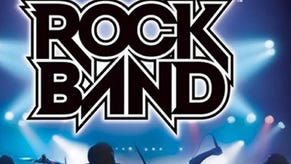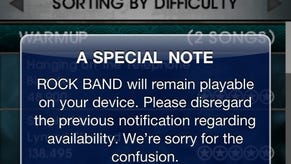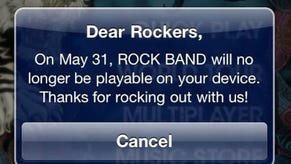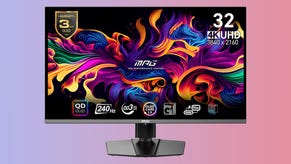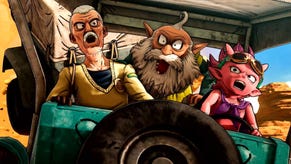Rock Band
The enemy makes friends.
Are you ready to rock? Again? With more peripherals? Of course you are. But is it as good as it obviously should be?
Rock Band is the most ambitious music game ever. You can sing, you can play guitar and you can drum, but most importantly you can get some friends round and do all three at once - with a fourth role for a bass player if you decide to buy a second guitar peripheral.
The initial reaction is that each discipline could stand up as its own game. Guitar-playing is a natural evolution of Guitar Hero: you still hold the fret button specified and strum as it passes through a bar at the bottom of the screen, and you can build up star power (sorry, "Overdrive") by playing certain sequences of highlighted notes flawlessly and then holding the neck aloft. But now you can also drop your left hand to a quintet of smaller frets closer to the body of the guitar to dance your fingers through complicated solos, and occasionally songs end with an unscripted finale that encourages you to cram in as much thrashing as possible before ending on a particular chord.
Vocals, meanwhile, replicate the SingStar approach. As lyrics scroll past, an undulating line illustrates the pitch and rhythm and a small arrow indicates whether you're above or below it as you croon into the bundled microphone. Unlike SingStar, though, you're sometimes asked to tap the microphone head at specified intervals as though it were a tambourine, and you're able to activate a points-multiplier by shouting during periods of inactivity.
Inevitably the drums are the biggest novelty. Most people who splurge the USD 170 on Rock Band (the UK price is still to be determined) will have experienced Guitar Hero, and if not SingStar then probably Karaoke Revolution, but games like DrumMania are still Japanese-only oddities for console owners and fleeting pleasures for people who still brave the arcades. Rock Band supplies a four-pad drum-set with a kick-pedal, and offers a Guitar Hero-esque control system: as icons move down a familiar fret-bar, you smash the corresponding drum in time, reaching for the kick-pedal when faced with a yellow line under all four frets.
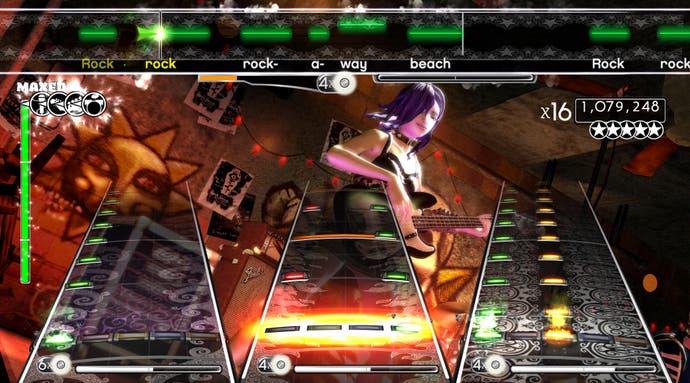
Played alone, there's a solo mode for each instrument, where you unlock songs in groups of five, and in a nice touch Harmonix has arranged the tracks in a different order for each discipline, reflecting the differing scales of difficulty. Played co-operatively with one, two or three other people, however, the screen fills comfortably with displays and the performance is more satisfying for its multiple facets. You feed off each other's energy during verses and choruses, strutting and grinning as spells of inactivity provide an opportunity to observe your band-mates caning plastic.
The track listing is unsurprisingly epic and crowd-pleasing. You might expect that from music industry super-giant MTV, which now owns developer Harmonix, but if your comparison is Guitar Hero then the reason is simpler than a change of pay-scales: these are songs designed to appeal whatever the instrument, rather than guitar specialties. There are 45 licensed tracks in the box, along with 13 bonus songs of less repute, and you're unlikely to encounter a friend who doesn't smile at more than a few. Radiohead, Bowie, Nirvana, the Chilli Peppers, Foo Fighters, Metallica, The Pixies, Weezer, Beastie Boys, Bon Jovi - most are huge names, and even the contemporary choices are pretty well judged, including the likes of OK Go and The Killers.
As usual, there's a scale of difficulty that should open the game up to anyone. Plastic-guitarists with experience can go straight to Hard or Expert and rip through power-chords and complicated solos, and the SingStar-esque reliance on pitch and rhythm rather than specific octaves opens that side of the game up considerably too. New-coming drummers may need more time to adjust, but there are sensible concessions there too: the kick-pedal is important to learn quickly, but the game initially plays to the beginner's natural impulse to combine a foot movement with a drumming motion, leaving room for improvement.
If your intention is to form a group with your friends and play together regularly, then Rock Band is simply brilliant. Band World Tour, where Harmonix has spent most of its time, allows you to assemble in your living room and tour a virtual world, creating custom rock personas, playing in dozens of venues and building up fan-base, cash and rewards. It uses specific challenges, double-or-nothing sets and unpredictable playlists to keep things interesting.
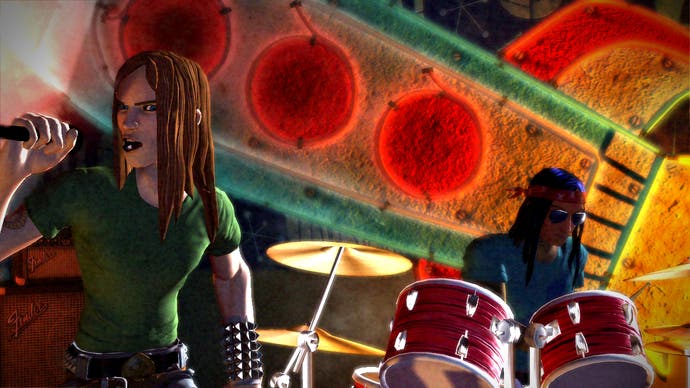
It also does a good job of getting you to play together. There are team Overdrives, Unity Phrases that involve everyone perfecting a sequence at once (except the vocalist, who can mop brows or spark up a Marlboro or something), and Overdrive can also be used to rescue team-mates. Sorry, band mates. You ride together, you die together. Especially since you can't continue to make progress after a certain point unless everyone (including the rubbish drummer) has graduated to a higher difficulty level. Practice is the order of the day, and practice together is best, since you often benefit from mapping out where best to use Overdrive.
As usual, the crowd goes wild in the background as you play (and even sings along nowadays when you're doing particularly well), and while Harmonix obviously couldn't re-use Guitar Hero's charming visual style, the alternative proposed here is classy and likeable. Characters have the same customisability, and background stage shows are more detailed - presented in slightly grainy fashion, with lots of neat visual flourishes like a body-mounted guitar view to frame finger movements. Venues and characters compare favourably to the developer's earlier work, and the loading screen slogans are no longer played for laughs, instead offering trivia. There are only so many Spinal Tap quotes you can use, after all.



